Yesika Salgado dissects “What I Know,” a poem from her book about family, love and loss, and the city she calls home. [Audio from our friends at NPR’s Latino USA.]
Mas…LatinoUSA Audio: “How I Made It” is Yesika Salgado’s love poem to L.A.
Yesika Salgado dissects “What I Know,” a poem from her book about family, love and loss, and the city she calls home. [Audio from our friends at NPR’s Latino USA.]
Mas…LatinoUSA Audio: “How I Made It” is Yesika Salgado’s love poem to L.A.
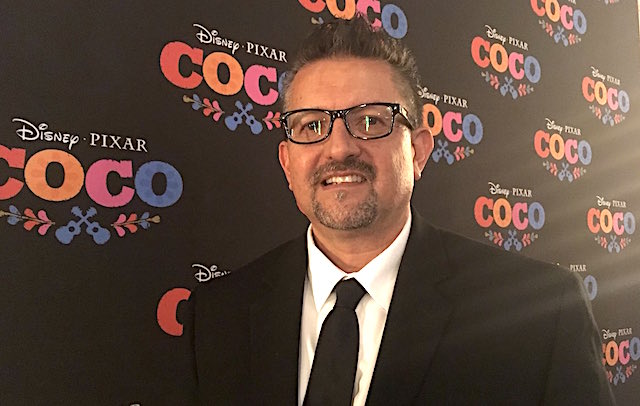
This is how they begin the story about POCHO Jefe-in-Chief Lalo Alcaraz and the Disney/Pixar film COCO over at NPR’s LatinoUSA:
Mas…POCHO’s Lalo Alcaraz: From Disney critic to COCO consultant (NPR audio)
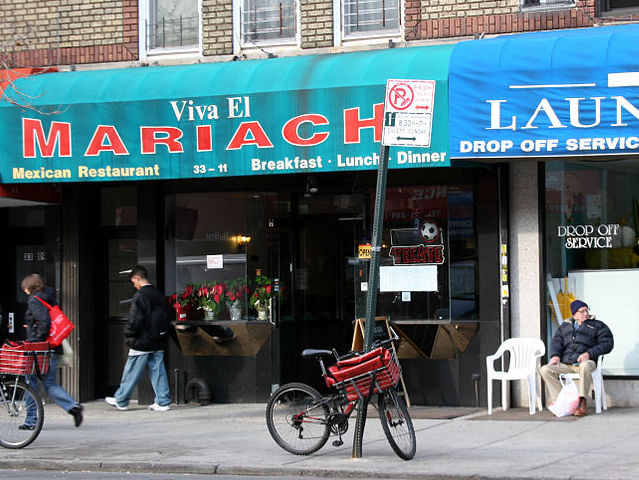
LatinoUSA’s Antonia Cereijido writes the intro:
If you go to a high-end restaurant in New York City, there’s a good chance that you’re dining among some of the wealthiest Mexicans in the world and being served by some of the poorest. This story was produced in collaboration with Round Earth Media. Tyler Kelley is a co-reporter on the piece.
[Mariachi Restaurant in Astoria, Queens, NY, photographed by Aude. Some rights reserved.]
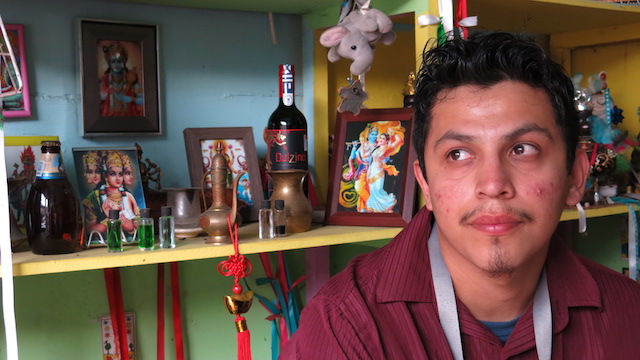
Yovany Diaz was brought to the U.S. without papers when he was only seven, and he grew up in Georgia, speaking English. When his mom’s health issues required him to move “back” to Mexico City, this all-American ice hockey loving pocho found himself in a strange new world, even though it was “home.” James Frederick of NPR’s Latino USA has the story.
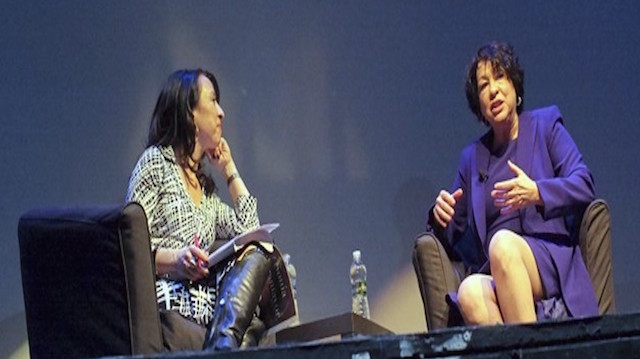 From 2013: LatinoUSA’s Maria Hinojosa talks to Supreme Court Justice Sonia Sotomayor about her memoir My Beloved World. The book tells the story of Sotomayor’s childhood in the South Bronx and her years before the court.
From 2013: LatinoUSA’s Maria Hinojosa talks to Supreme Court Justice Sonia Sotomayor about her memoir My Beloved World. The book tells the story of Sotomayor’s childhood in the South Bronx and her years before the court.
 “Jennifer De Benito could have had any piñata she wanted for her 14th birthday party. She chose a piñata of Donald Trump. The three-foot-tall piñatas depict Trump in a business suit with his infamous blonde hair and they’re flying off the shelves on both sides of the U.S.–Mexico border,” writes Samantha Clark.
“Jennifer De Benito could have had any piñata she wanted for her 14th birthday party. She chose a piñata of Donald Trump. The three-foot-tall piñatas depict Trump in a business suit with his infamous blonde hair and they’re flying off the shelves on both sides of the U.S.–Mexico border,” writes Samantha Clark.
“It all started last summer when Trump said Mexico was “bringing drugs, they’re bringing crime, they’re rapists.”
“Jesús Márquez makes piñatas in Watsonville, a small farming town on the central coast of California. Márquez is from Mexico and says that although Trump’s comments are racist, they have been good for business.”
Maria Hinojosa of NPR’s Latino USA reports:
Mas…Latino USA: Trump is good for business – the piñata business (audio)
Cute, curious kids at the Mexican Israelite Church of God in Brooklyn have many questions about their neighbors –– mysterious Hasidic Jews. Example: What is the deal with those big fur hats?
Debbie Nathan reports for LatinoUSA:
Mas…Brooklyn’s Mexican Israelite kids meet a local rabbi (audio)
Cuban culture has dominated Latino Miami ever since Cubans arrived after Castro’s revolution 50 years ago. But recently, other Latin Americans have been moving in, and some are asking if Cuban immigrants get preferential treatment. Maria Murriel and Maria Hinojosa report for LatinoUSA.
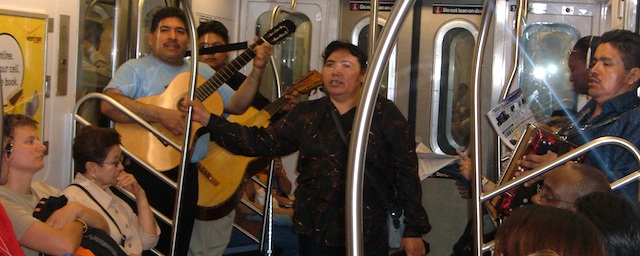 If you go to a high-end restaurant in New York City, there’s a good chance that you’re dining among some of the wealthiest Mexicans in the world and being served by some of the poorest.
If you go to a high-end restaurant in New York City, there’s a good chance that you’re dining among some of the wealthiest Mexicans in the world and being served by some of the poorest.
Antonia Cereijido of Latino USA reports:
Mas…NYC is home to America’s richest – and poorest – Mexicans (audio)
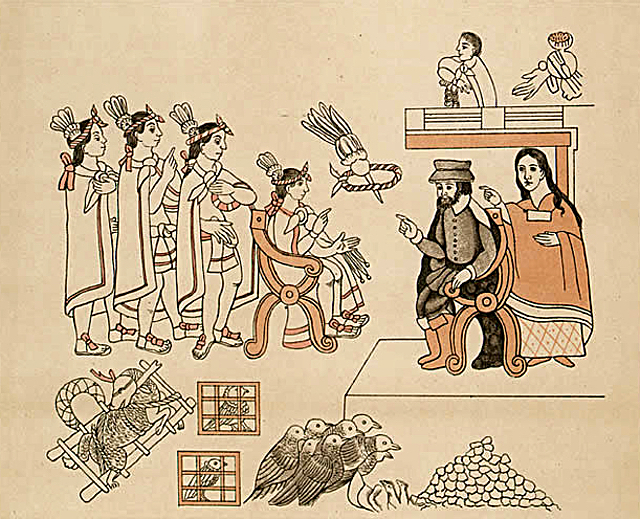 Malinche: You love her, you hate her.
Malinche: You love her, you hate her.
LatinoUSA calls her Mexico’s Eve. Antonia Cereijido reports:
La Malinche, often referred to as “the mother of all mestizos” is one of the most controversial figures in Mexican history. She’s been called a traitor and a victim. She was a Nahua woman who acted as interpreter for the conquistadors in the early sixteenth century. She had a child with Hernan Cortes named Martín and he is often called the “first mestizo.” Mestizos are the mixed race people of Mexico that make up 60% of the country. Her legend led to the creation of the term “Malinchista.” A Malinchista is a traitor, or someone who denies their Mexican culture in favor of another.
But since the 1950s, female writers have been trying to reclaim and vindicate the story of La Malinche – not just in Mexico but also here in the U.S. Chicana writers relate to La Malinche. They too are stuck between two cultures: their Mexican heritage and the U.S. culture they live their daily lives in.
Here’s the radio report:
Mas…LatinoUSA: Malinche, Mexico’s Eve, the mother of all mestizos (audio)
Southern California pochos Chicano Batman started out in the hood, lucked out with a spot at Coachella and then went on the road opening for Jack White. They shared their story with LatinoUSA.
The band’s latest video is Cycles of Existential Rhyme:
Mas…From LatinoUSA: The unlikely story of Chicano Batman (audio, video)
“The Zorro story, invented in 1919 by pulp fiction author Johnston McCulley, tells the tale of an aristocrat in Spanish California who dons a mask to fight against corrupt colonial officials on behalf of the oppressed,” writes Marlon Bishop of Latino USA.
Mas…Out of the night, when the full moon is bright! America’s first superhero
 Like puro pochos, the peeps at Latino USA talk Spanglish. In this episode they talk about their favorite Spanglish vocabulary words and also check in with expert and POCHO amigo Professor Ilan Stavans, who literally wrote the book on Spanglish.
Like puro pochos, the peeps at Latino USA talk Spanglish. In this episode they talk about their favorite Spanglish vocabulary words and also check in with expert and POCHO amigo Professor Ilan Stavans, who literally wrote the book on Spanglish.
Mas…Latino USA: Favorite Spanglish words and Ilan Stavans (audio)
Leftist loonies like Nicolas Maduro of Venezuela don’t much like criticism or mockery (i.e., reality) so they throttle creative freedom.
Israel Centeno, who fled the Venezuelan Bolivarian socialist paradise, is among the exiled writers who have found a safe place to live and write in Pittsburgh, Pennsylvania.
Latino USA’s Erika Beras brings us the writers’ stories:
Mas…In Pittsburgh, PA writers from Venezuela, El Salvador are free (audio)
“There are some words, not many, just a few — that we decided, we won’t use them all the time,” said the late comedian George Carlin in his famous routine about the “seven dirty words.” If you aren’t familiar with it –– the skit tries to pinpoint a definitive list of words you can never say on radio and television [See NSFW video below.]
Mas…Felipe Esparza: The Seven Spanish Cuss Words (LatinoUSA audio)
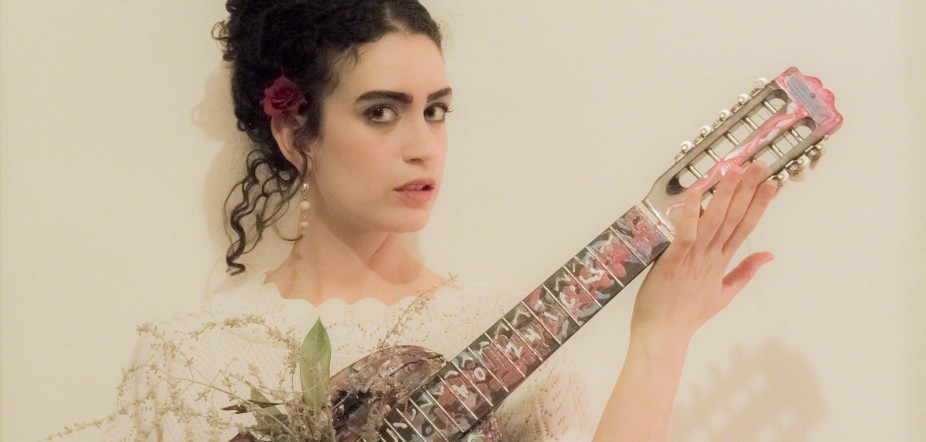 Philly singer-songwriter Rosa Diaz started a Charles Bukowski-themed project, and to make it authentic, she became a Method Actor — actually living the writer’s hard-drinking life style until it almost killed her.
Philly singer-songwriter Rosa Diaz started a Charles Bukowski-themed project, and to make it authentic, she became a Method Actor — actually living the writer’s hard-drinking life style until it almost killed her.
LatinoUSA’s Nadia Reiman reports:
In this recent a capella music video, Diaz sings about Pain:
Mas…Rosa Diaz goes ‘method’ on Charles Bukowski project (audio, video)
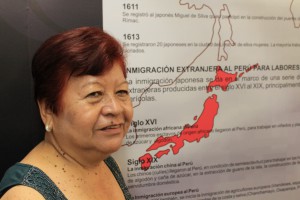 Not only did Uncle Sam lock up Japanese-Americans in “internment camps” during World II, but a 1942 regional security pact also became the legal cover for shipping 1800 Peruvians of Japanese descent to the very same camps. Carmen Utako Tochio Villanueva (photo), who was born into one of those families in a Texas internment camp, tells her story to LatinoUSA’s Mia Warren:
Not only did Uncle Sam lock up Japanese-Americans in “internment camps” during World II, but a 1942 regional security pact also became the legal cover for shipping 1800 Peruvians of Japanese descent to the very same camps. Carmen Utako Tochio Villanueva (photo), who was born into one of those families in a Texas internment camp, tells her story to LatinoUSA’s Mia Warren:
Mas…Did you know? U.S. ‘interned’ Peruvians of Japanese descent (audio)
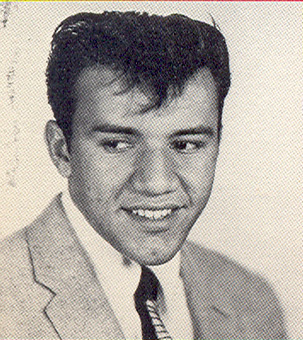
From Latino USA: Little Julian Herrera was a heartthrob singer in East L.A.’s rock and R&B music scene. But one day, he disappeared, taking with him the secrets behind his identity and his fate. A fascinating story from Alex Schmidt.
Mas…Missing: Little Julian Herrera, East Los Chicano Rock ‘Bigfoot’ (audio)
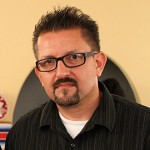 |
 |
A few weeks ago we featured some astounding videos of actors’ (dramatic) readings of Yelp customer reviews — customer reviews of US-Mexico border crossings.
NPR’s Latino USA with Maria Hinjosa snagged Jefe-in-Chief Lalo Alcaraz last week to find out if he had anything to add to the discussion.
Listen here to learn if he did! 😉
Mas…POCHO Jefe Lalo Alcaraz Yelps about the border on NPR (audio)
From NPR: When Disney tried to trademark Dia de los Muertos for their new movie merchandise inspired by the Mexican holiday, Latinos picked up their own mice, went online and turned things back around.
For this week’s News or Noise, Latino USA guest host Luis Antonio Perez speaks with POCHO Jefe-in-Chief Lalo Alcaraz and Kety Esquivel, a digital media strategist, about how Latinos online retaliated against the entertainment giant.

 When Austin resident Trina Hernandez (photo) found out her family had Jewish roots, it allowed her to ditch the commercial aspects of Christmas she had long disliked and connect to a tradition she found more meaningful for her and her son. From NPR’s Latino USA with Maria Hinojosa.
When Austin resident Trina Hernandez (photo) found out her family had Jewish roots, it allowed her to ditch the commercial aspects of Christmas she had long disliked and connect to a tradition she found more meaningful for her and her son. From NPR’s Latino USA with Maria Hinojosa.
RELATED: